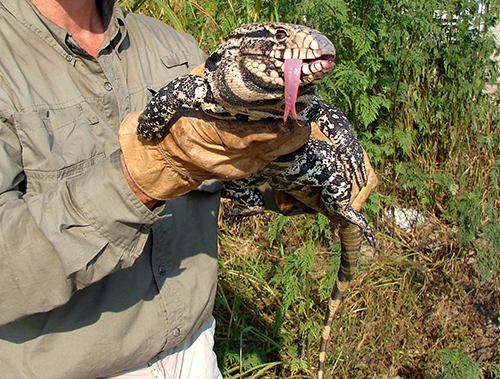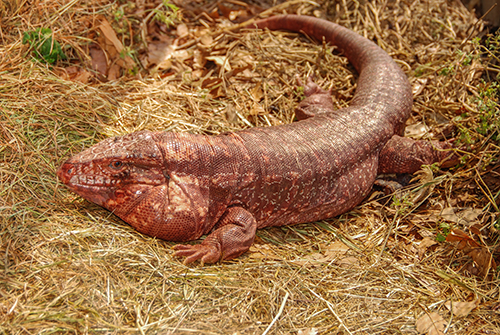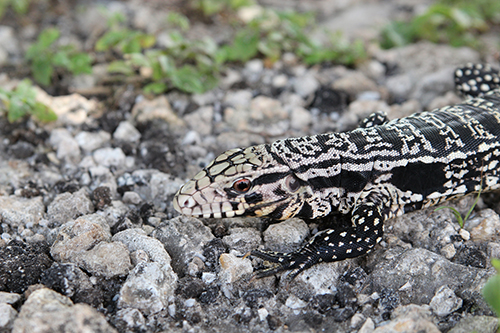Tegu Lizards
Origin:
South America (Argentina, Brazil, Paraguay, Urauguay)
Introduction to Florida:
Escaped or released pets
Stage on Invasion Curve:
Containment



Description
The Argentine black and white tegu (Salvator merianae) is a large lizard that grows up to 4 feet long. It is black and white with banding along its tail. Hatchlings have green on their heads which fades after a few months.
Two other tegu species have been found in South Florida and have the potential to become invasive. The gold tegu (Tupinambis teguixin) grows to 2–3 feet long and has black and gold stripes down its body. Red tegus (Salvator rufescens) can reach up to 4.5 feet and the males have large jowls.
Impacts
Tegus eat fruits, vegetables, eggs, insects, dog or cat food, and small animals like lizards and rodents. In Florida, tegus have dug into alligator and turtle nests and eaten the eggs. A growing and spreading tegu population is a threat to native wildlife such as crocodiles, sea turtles, ground-nesting birds, and small mammals.
Where to Find Them
Argentine black and white tegus are breeding in parts of Miami-Dade and Hillsborough counties. The large South Florida population is centered in Florida City and is spreading to new areas. There is also a small breeding population of gold tegus in Miami-Dade County. Red tegus have been seen in Florida but are not known to be breeding.
Tegus spend most of their time on land and are often seen on roadsides or other disturbed areas. They can swim and may submerge themselves for long periods of time. Tegus are mainly active during the day. They spend the colder months of the year in a burrow or under cover.
Distribution Maps
What You Can Do
- If you see a tegu, please take a picture, note the location, and report your sighting:
- By phone: 1-888-IVE-GOT1
- Online: IveGot1.org
- Or download the IveGot1 reporting app
- Do your research before buying an exotic pet, and remember, Don’t Let It Loose!
- Surrender unwanted exotic pets at one of FWC’s Exotic Pet Amnesty Day events or call the Pet Amnesty hotline at 1-888-IVE-GOT1
More Information
Brochures and Fact Sheets:
- Tegus in Florida: How You Can Help Stop the Spread of an Invasive Lizard (FWC)
- Florida Invader: Tegu Lizard (UF)
- Nonnative Reptiles in South Florida: Identification Guide (UF)
- Quick Reference Guide: Large Lizards in Florida (UF)
- The Invasion of Exotic Reptiles and Amphibians in Florida






